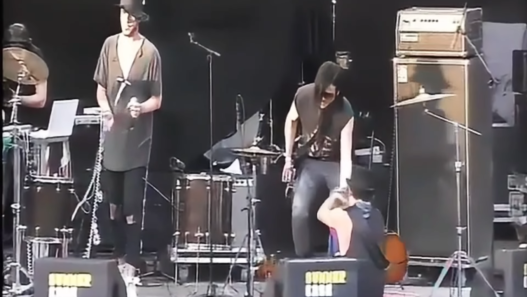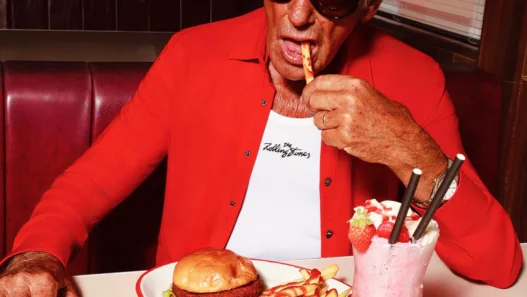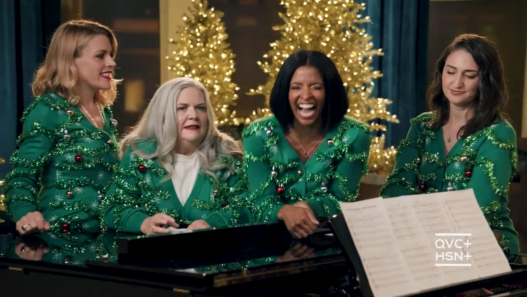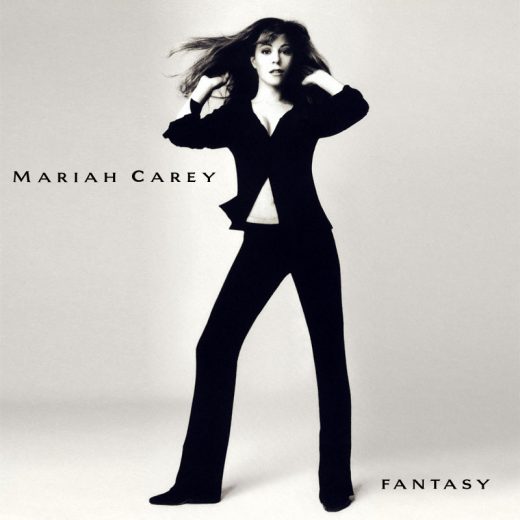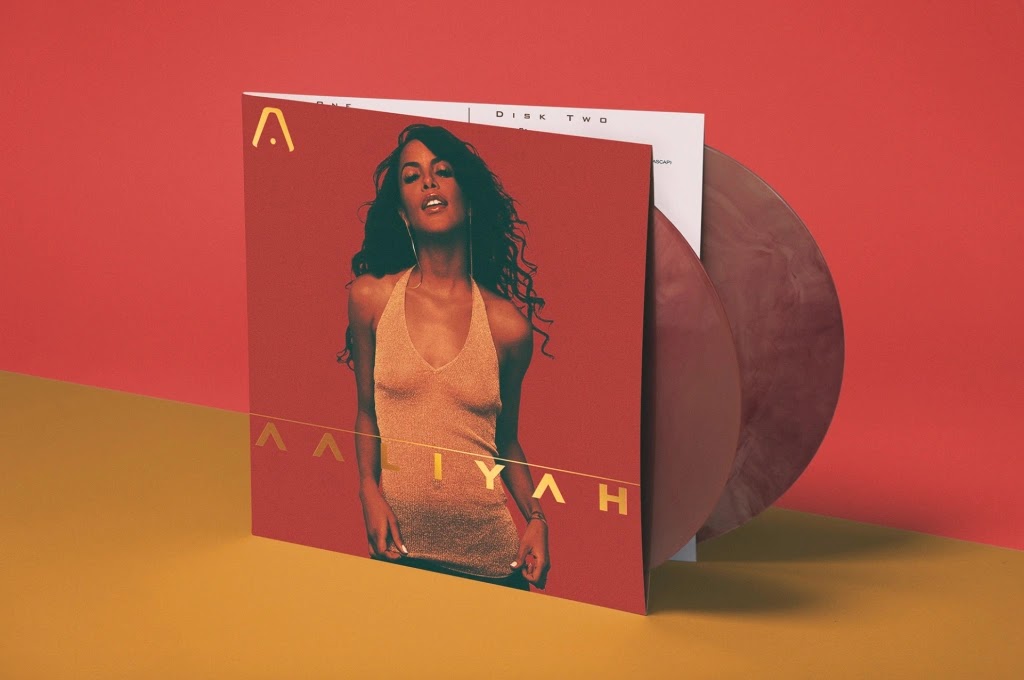According to one of our preferred sources:
In their time, Talking Heads were a true pop-music marvel — weirdo outsiders who kept toying with their sound and who kept growing artistically while finding a massive audience. But Talking Heads never really threatened to top the pop charts. The band only ever made the top 10 once. (1983’s “Burning Down The House” peaked at #9. It’s a 9.) Years after the band broke up, though, two Talking Heads got writing credits on a massive generational smash — one of those beautiful little moments when sampling worked out swimmingly for everyone involved.
In 1981, during the break between Remain In Light and Speaking In Tongues, all the different Talking Heads went off to work on other projects. David Byrne made My Life In The Bush Of Ghosts with Brian Eno. Jerry Harrison recorded his solo album The Red And The Black. And Tina Weymouth and Chris Frantz, Talking Heads’ married-couple rhythm section, went off to Compass Point, the Bahamian recording studio that Island Records boss Chris Blackwell had founded, and got their own quirky little funk band going.
Tom Tom Club — named after a local disco, not after two-year-old me — was a chance for Frantz and Weymouth to goof around and get playful without having to indulge David Byrne’s ever-expanding ambitions. The most enduring song from Tom Tom Club’s self-titled 1981 album is “Genius Of Love,” a twinkly and off-kilter dance track that Frantz and Weymouth wrote with the former King Crimson guitarist Adrian Belew, who’d already joined the touring Talking Heads band, and with Steven Stanley, the Jamaican-born keyboardist who was Compass Point’s in-house producer. (Adrian Belew’s highest-charting single as a solo artist, 1989’s “Oh Daddy,” peaked at #58.)
Tina Weymouth actually didn’t play bass on “Genius Of Love,” though she did write the bassline; her hand was cramping up badly in the studio that day. Weymouth did, however, sing lead on the song, with her sisters Lani and Laura and her brother Loric singing backup. The song is a dazed, silly love letter to Black music, with lyrical shoutouts to Bootsy Collins, George Clinton, Kurtis Blow, James Brown, and Bohannon, among others. Maybe because of that — or maybe just because of the strange appeal of its naive, twinkling groove — “Genius Of Love” found a Black audience that never really gravitated to Talking Heads. “Genius Of Love” became a #1 club hit and went to #2 on the Billboard R&B charts. It also crossed over to the Hot 100, where it peaked at #31 — higher than all but three Talking Heads singles.
“Genius Of Love” happened to come along at the same time as sample-heavy rap music was just starting to become a commercial proposition. The first rap group to sample “Genius Of Love” was Dr. Jeckyll & Mr. Hyde, the duo that included future Uptown Records founder Andre Harrell. Jeckyll & Hyde used the “Genius Of Love” groove on their single “Genius Of Rap” in 1981, before the Tom Tom Club track even reached its Hot 100 peak. A year later, Grandmaster Flash & The Furious Five, the biggest rap group of their era, used that same “Genius Of Love” groove on their own single “It’s Nasty (Genius Of Love).” Those early singles involved studio bands re-playing “Genius Of Love,” not sampling the beat directly from the record. In the years that followed, “Genius Of Love” remained part of the rap language.
Tom Tom Club kept recording occasional albums after that first one, and none of them really caught on. But “Genius Of Love” lingered. That sample was especially popular in West Coast rap in the early ’90s. Ice Cube, 2nd II None, Above The Law, Mellow Man Ace, and former Number Ones artist Coolio all rocked over the “Genius Of Love” beat or referenced its dreamy, childlike lyrics in the early ’90s. Then, in 1995, the queen of the Hot 100 was starting to push her music more in the direction of rap and R&B, and it took the “Genius Of Love” beat to fully cross her over to the audience that she wanted.
By 1995, nobody could tell Mariah Carey shit. At that point, five years into her career, she’d already landed at #1 eight times, and she’d co-written seven of those chart-toppers. With Mariah’s 1993 album Music Box, her husband and label boss Tommy Mottola actively pushed her in the direction of centrist, adult-contempo pop ballads. Mariah had flirted with house music on 1991’s Emotions, and it hadn’t been quite the blockbuster that Mottola wanted, so he clamped down on her playful side. Music Box did even better than anyone could’ve anticipated, going diamond and sending two more singles to #1.
In 1994, Carey released the holiday album Merry Christmas, which went triple platinum in its first year. (It’s now octuple platinum, and one of its songs will appear in this column a long time from now.) That same year, she also teamed up with Luther Vandross to cover Diana Ross and Lionel Richie’s 1981 chart-topper “Endless Love,” and the Vandross/Carey version of the song peaked at #2. (It’s a 5.) Point is: Mariah Carey was a commercial juggernaut, and she’d earned herself some artistic freedom — or, at least, she thought she had.
Despite all the records she was selling in the mid-’90s, Mariah Carey still had to fight for her ideas. In the time that she spent recording her 1995 album Daydream, for instance, Mariah had the idea to blow off steam by recording a shits-and-giggles grunge-pop album, so that’s what she did. But certain unnamed people at Carey’s label thought that a record like that would damage her image, so she wasn’t allowed to sing lead on the album that came out under the title Someone’s Ugly Daughter. Instead, Carey’s friend Clarissa Dane sang lead, with an uncredited Mariah singing backup and co-writing every song. The album came out under the band name Chick, and it promptly disappeared completely. Nobody even knew that Chick was a Mariah Carey project until she wrote about it in her 2020 memoir.
Mariah faced similar pushback when she tried to push her own music closer to the rap and R&B that she loved. She hated being seen as a square pop diva, and she wanted love from Black listeners. Years later, Carey’s A&R rep Cory Rooney told Billboard, “[Mariah] once told me though she was grateful for her success, she would trade in all of her record sales to get the respect that Mary J. Blige got. She said, ‘Mary doesn’t have to sell 28 million records to be respected. People respect Mary, and I just want to be respected like her.’” (Mary J. Blige will eventually appear in this column.)
That’s what Carey was going for when she worked with Mary J. Blige’s What’s The 411? collaborator Dave “Jam” Hall on her 1993 smash “Dreamlover.” Mariah worked with Hall again two years later when she had another idea for a bubbly, lightweight, clubby R&B track. She’d already had a basic melody idea for the song that would become “Fantasy” when she heard Tom Tom Club’s “Genius Of Love” on the radio. In Fred Bronson’s Billboard Book Of Number 1 Hits, Mariah says that hearing the song “reminded me of growing up and listening to the radio.”
Mariah took “Genius Of Love” to Dave Hall, and he made it into a beat. Working with Mariah in the studio, Hall would play the beat, and Mariah would freestyle melody ideas for 15 or 20 minutes at a time. Within a couple of days, they had a complete song. Mariah’s people got in touch with Tom Tom Club to clear the sample. In the Bronson book, Mariah says that Chris Frantz and Tina Weymouth “were really into it.” Makes sense to me. If someone told me that they wanted to park a dumptruck full of cash on my front lawn, I wouldn’t object. (I don’t actually have a front lawn, so we would need to have a conversation about logistics, but I’d be down.)
In its final form, “Fantasy” twinkles and glistens. Mariah sings the song in an airy, flutter, once again layering her mind-bending leads over a soft bed of her own multi-tracked backing vocals. It’s a song about a crush, about imagining yourself with someone else while remaining perfectly aware that nothing’s going to happen. I guess that means it’s a song about enjoying your own dream-life, using it as an escape from whatever’s happening in reality. On and on and on, it’s so deep in her daydreams, but it’s just a sweet, sweet fantasy, baby.
I love Mariah’s vocal on “Fantasy,” the way she hammers the hell out of that opening line: “Oh, when you walk by every night, talking sweet and looking fine, I get kinda hectic in-side!” Her melody syncs up beautifully with the sample, and it gives the song a kind of unreal playfulness. When she actually sings a little bit of “Genius Of Love” on the bridge — “I’m in heaven with my boyfriend, my lovely boyfriend” — Mariah sounds like she’s singing along with the radio, or with a scrap of lyric that’s stuck in her head and clicks in with whatever she’s feeling.
Of course, the final form of “Fantasy” wasn’t really the final form. The album version of “Fantasy” — the one that technically topped the Hot 100 — isn’t the definitive take on the song. That version of “Fantasy” is a gorgeous, incandescent Mariah Carey jam, but it’s not ultimately that different from something like “Dreamlover.” It took a remix to unlock what “Fantasy” could be and to point a way forward for Mariah Carey, and also for the rest of pop music in general.
At the time, nearly every big pop single got at least a couple of remixes. Mariah Carey had embraced the idea of the remix, working with house master David Morales to break down her songs and to rebuild them in completely new forms, even re-recording her vocals when the track called for it. Tommy Mottola knew that “Fantasy” needed a remix, and both Mariah and her A&R rep Cory Rooney thought the gig should go to Sean “Puffy” Combs, the former Uptown Records vice president who, once fired from Uptown, started Bad Boy Records, his own rap and R&B empire. (As lead artist, Puffy will eventually appear in this column.) Earlier in 1995, Puffy’s protege Biggie Smalls, another future Number Ones artist, had reached #2 with “One More Chance/Stay With Me,” a lush and R&B-flavored remix of a track that had appeared on Biggie’s classic debut Ready To Die. (It’s a 9.)
Puffy was about as in-demand as a remixer could be, but Tommy Mottola didn’t want anything to do with him. Rooney tells Billboard that Mottola told him, “We need someone more musically inclined” when Rooney suggested Puffy. Mariah herself goes even further. In her memoir, Mariah tells a story about Mottola getting angry and jealous when she talked about Puffy’s brilliance at a dinner party. Mariah claims that Mottola told her, “Puffy will be shining my shoes in two years.” She writes that Mottola didn’t understand rap music and that he felt threatened by it, but Mariah still got her Puff Daddy remix.
Puff himself was dubious. In that Billboard piece, Cory Rooney says that Puffy initially turned down the opportunity: “Absolutely not, she’s wack. I’m on a little streak right now… I don’t need no wack juice on me.” Rooney says that Puffy changed his mind when he learned how many records Mariah Carey sold, and he negotiated a $60,000 fee for a remix. Puff was adamant that Dave Hall had sampled the wrong parts of “Genius Of Love,” so he switched it up, slowing the track down and focusing on the bassline. In the hands of Puffy and his collaborators, “Fantasy” was harder and more minimal, and Mariah’s voice, pitched down just slightly, still fit the track beautifully. Puffy murmured his trademark ad-libs on the remix, riffing on another bit from “Genius Of Love”: “Whatcha gonna do when you get out of jail? I’m gonna make a remix.”
The real X-factor for the Bad Boy remix of “Fantasy” was the addition of Ol’ Dirty Bastard, the Wu-Tang Clan member and genuinely unhinged folk-hero lunatic. The Wu-Tang Clan, the chaotically brilliant mind-warrior Staten Island crew, had ripped a hole through the center of the rap universe with their 1993 debut album. Amidst all the group’s technical wizards, Dirty stood out as a guttural, unpredictable livewire. People loved Ol’ Dirty Bastard. I loved Ol’ Dirty Bastard. He was the straw that stirred the drink, and his chaos-agent persona was just as powerful as his music. The stories about Dirty — like the time that he took a limo and an MTV News camera crew to cash his welfare check — were instant oral-tradition legends.
Most of the Wu-Tang members locked down solo deals with different labels, and Dirty ended up on Elektra. He released his platinum debut Return to the 36 Chambers: The Dirty Version early in 1995, and he got to #54 with his debut single “Brooklyn Zoo.” (You’d think that “Shimmy Shimmy Ya” was the big hit from that album, but no, that one peaked at #62.) Mariah Carey loved ODB, and she’s the one who specifically requested Dirty for the “Fantasy” remix. In her memoir, Mariah describes ODB’s whole appeal: “ODB’s energy was something everyone could relate to — he was your loving, fun-ass uncle who gets drunk at all the festivities, at Christmas dinner, the cookout, Thanksgiving.”
To hear Cory Rooney tell it, Ol’ Dirty Bastard was a nightmare collaborator. After accepting $15,000 to rap on the “Fantasy” remix, Dirty showed up at the studio at 10:30 at night, spent an hour arguing with a girlfriend on the phone, and then demanded Newports and Moet, getting furious when the studio people couldn’t find him what he wanted that late at night. The story of Dirty recording his “Fantasy” verse, as Rooney told Billboard, is so good that I’m going to have to quote it at length:
He said one line — “me and Mariah go back like babies with pacifiers” — then paused, said, “Yo, I need to take a break,” and went to sleep for 45 minutes. He woke up and was like, “Yo, let me hear what I did so far.” We played his one line back, he sang another line or two, and then slept for another hour. He would come up with a line, punch that in, go to sleep. He went to sleep 3 different times in the middle of trying to get that one verse done.
Once the verse was finally finished, someone from the studio called Mariah and played her the remix over the phone, and she could barely contain her glee. Tommy Mottola was less impressed. In her book, Mariah quotes him: “The fuck is that? I can do that. Get the fuck outta here with that.” This is one of those true generational-schism moments in pop history. To me and just about everyone I knew, that remix — especially Dirty on that remix — was the best thing in the world. The “babies with pacifiers” line? The ragged shoutouts to Sacramento and Japan? The echo all over Dirty’s voice? I love it. I love it all. When that remix would come on at parties, it was always the best moment of the night.
The contrast between Ol’ Dirty Bastard’s grizzled, garbled roar-bark and Mariah’s flirty silkiness proved massively influential; I’d argue that it’s the whole basis for the Ja Rule tracks that will eventually appear in this column. But you couldn’t manufacture the particular magic of the “Fantasy” remix. It worked best when it was new and disorienting, when it made no sense at all. The “Fantasy” remix didn’t appear on Mariah’s Daydream album, but a different “Fantasy” remix, David Morales’ house reworking “Daydream Interlude (Fantasy Sweet Dub Mix),” is on there. Later on, though, Mariah herself estimated that the Bad Boy remix was responsible for at least half the sales of “Fantasy” — a whole lot, considering that the single eventually went quintuple platinum. Maybe Puffy’s remix just took everyone by surprise. In any case, “Fantasy” followed Michael Jackson’s “You Are Not Alone” as the second single to debut atop the Hot 100.
I’m a little flummoxed on how to rate “Fantasy,” since the version that went to #1 was the single version, not the Bad Boy remix. But the remix helped drive the single, and it’s the definitive version of the song. At the end of this column, the rating you see will be the one for the Bad Boy remix. If you want to think of the original “Fantasy” as the real one, just go ahead and subtract one point from the total.
Mariah Carey wasn’t just taking creative control with her remixes. She wanted to take over every aspect of her own presentation. Mariah had never been entirely happy with her music videos, so “Fantasy” was the first video that she ever directed herself. She shot the clip at Playland, a little rinky-dink amusement park in Westchester County, New York. (It’s the same place where they shot the kid wishing to be big in Big, and it’s still open today.) The clip is simple and fun and carefree — Mariah singing on a rollercoaster, dancers dancing, little kids being cute, an inexplicable evil-clown laugh opening the whole thing.
The video for the remix is just a chopped-up version of the original, with shots of Ol’ Dirty Bastard rapping on the Playland boardwalk, with the clown tied up behind him. Once again, Dirty was apparently a nightmare on the shoot. Cory Rooney claims he demanded to be taken to the mall and that he left with a couple of designer suitcases stuffed with clothes, and that he did not then wear those clothes in the video. In her book, Mariah writes that Dirty had one particular demand: “I want a wig, like one of them motherfuckers from the ’60s. Like Al Green. I’m this generation’s Al Green.” Dirty got his wig, and he wore it in the video. He looked perfect.
“Fantasy” and its remix did what Mariah Carey wanted them to do. Mariah already had plenty of R&B-radio hits, but she really won people’s hearts with “Fantasy.” She got to feel that Mary J. Blige respect. In the years that followed, Mariah Carey would turn more definitively toward rap-flavored R&B. Given where the charts were going, that was the exact right decision. We’ll see plenty more of Mariah Carey in this column. We’ll see more Sean “Puffy” Combs, too.
Sadly, we will not see Ol’ Dirty Bastard again. Dirty went on to more adventures. He rescued a little girl from a car wreck. He bum-rushed Shawn Colvin’s acceptance speech at the Grammys, taking exception to his “Fantasy” collaborator Puff Daddy beating the Wu-Tang Clan in the rap category. He scored his biggest pop hit as lead artist when the 1999 Neptunes/Kelis collab “Got Your Money” peaked at #33. He got shot in a robbery, and he beat a charge after cops claimed that he’d shot at them. He got arrested for crack possession and, after escaping from his court-ordered rehab facility, went on the run, still popping up to perform at a Wu-Tang show in New York while on the lam. Eventually, he spent three years in prison. In 2004, a year after his release from prison, Ol’ Dirty Bastard, while working in a New York recording studio, collapsed and died of a drug overdose. He was 35 years old. Ol’ Dirty Bastard’s death hit me harder than almost any loss of a musician that I can remember. We won’t ever see anyone like him again.
GRADE: 10/10 – The Number Ones: Mariah Carey’s “Fantasy” (stereogum.com)



